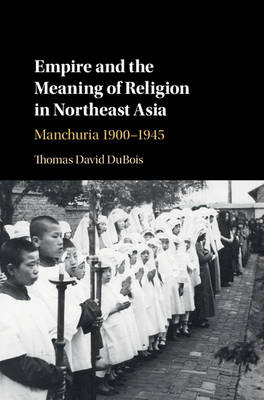
Empire and the Meaning of Religion in Northeast Asia
Manchuria 1900–1945
Seiten
2016
Cambridge University Press (Verlag)
978-1-107-16640-0 (ISBN)
Cambridge University Press (Verlag)
978-1-107-16640-0 (ISBN)
DuBois shows how religion shaped the commercial, political and social development of a key region of Asia, revealing how many of these changes shaped the global personality of religion as we know it today. It will be of great interest to both scholars and students of Asian history alike.
Manchuria entered the twentieth century as a neglected backwater of the dying Qing dynasty, and within a few short years became the focus of intense international rivalry to control its resources and shape its people. This book examines the place of religion in the development of Manchuria from the late nineteenth century to the collapse of the Japanese Empire in 1945. Religion was at the forefront in this period of intense competition, not just between armies but also among different models of legal, commercial, social and spiritual development, each of which imagining a very specific role for religion in the new society. Debates over religion in Manchuria extended far beyond the region, and shaped the personality of religion that we see today. This book is an ambitious contribution to the field of Asian history and to the understanding of the global meaning and practice of the role of religion.
Manchuria entered the twentieth century as a neglected backwater of the dying Qing dynasty, and within a few short years became the focus of intense international rivalry to control its resources and shape its people. This book examines the place of religion in the development of Manchuria from the late nineteenth century to the collapse of the Japanese Empire in 1945. Religion was at the forefront in this period of intense competition, not just between armies but also among different models of legal, commercial, social and spiritual development, each of which imagining a very specific role for religion in the new society. Debates over religion in Manchuria extended far beyond the region, and shaped the personality of religion that we see today. This book is an ambitious contribution to the field of Asian history and to the understanding of the global meaning and practice of the role of religion.
Thomas David DuBois is a leading scholar of religion in East Asian history, and is the author of Religion and the Making of Modern East Asia (Cambridge, 2011) and Sacred Village: Social Change and Religious Life in Rural North China (2005). His work has been published in Arabic, Chinese and Russian translation.
Introduction; 1. Foundations of religion in society in Manchuria; 2. From the blood of the martyrs; 3. The mind of empire; 4. Piety in print; 5. The laws of men; 6. A charitable view; 7. Manchukuo's filial sons; 8. May God bless Manchukuo; Conclusion; Appendices; Bibliography.
| Erscheinungsdatum | 06.01.2017 |
|---|---|
| Zusatzinfo | 3 Maps; 18 Halftones, black and white |
| Verlagsort | Cambridge |
| Sprache | englisch |
| Maße | 160 x 234 mm |
| Gewicht | 500 g |
| Themenwelt | Geisteswissenschaften ► Geschichte ► Regional- / Ländergeschichte |
| Geschichte ► Teilgebiete der Geschichte ► Religionsgeschichte | |
| Geisteswissenschaften ► Religion / Theologie ► Buddhismus | |
| Religion / Theologie ► Christentum ► Kirchengeschichte | |
| ISBN-10 | 1-107-16640-3 / 1107166403 |
| ISBN-13 | 978-1-107-16640-0 / 9781107166400 |
| Zustand | Neuware |
| Haben Sie eine Frage zum Produkt? |
Mehr entdecken
aus dem Bereich
aus dem Bereich
Herkunft, Blüte, Weg nach Osten
Buch | Hardcover (2024)
C.H.Beck (Verlag)
39,00 €
Von den Anfängen bis zur Gegenwart
Buch | Hardcover (2022)
C.H.Beck (Verlag)
34,00 €
warum die Religionen erst im Mittelalter entstanden sind
Buch | Hardcover (2024)
C.H.Beck (Verlag)
38,00 €


